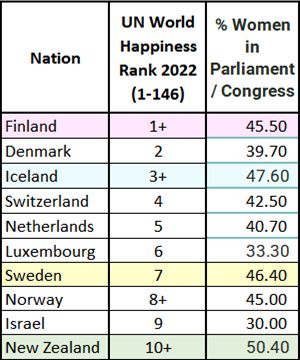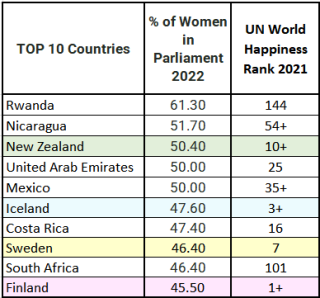Happiness
Will Electing More Women Make Us Happier?
Gallup and UN studies show significant correlations.
Posted January 17, 2023 Reviewed by Vanessa Lancaster
Key points
- The happiest countries are not just exceptionally happy, they are also exceptional in gender equality, says the UN World Happiness Report.
- The World Happiness Report finds that eight of the top 10 happiest countries have over 40 percent of women in parliamentary posts.
- Current studies show a significant correlation between higher percentages of women in office and citizen happiness reports.

Ask most women, and they will answer, “Yes, electing more women would make everyone happier.”
Women know that, compared with men, they more often work together to achieve socially beneficial outcomes, and they are more aware of the needs of others, as identified in the United Nations World Happiness Report (WHR)as global factors affecting national happiness levels.
Over the past 150 years in the United States, women have bridged social, racial, and religious differences to crusade together for health services for women and children and safe working conditions and housing, whether or not they were in elected office or even had the vote.
The United Nations, with the help of the Gallup organization, has polled citizens in 146 nations since 2013, asking them to assess their levels of happiness. They have concluded that several metrics drive citizens to report overall satisfaction and that the happiest countries are not just exceptionally happy. They are also exceptional in their gender equality.
Eight of the top ten WHR happiest nations have over 40 percent of women in parliamentary posts. One, New Zealand, has over 50 percent. Even the lowest, Israel, with over 30 percent women in office, ranking 64th out of 187 nations, has a higher percentage than the United States, at 28 percent women in office (not one of the top ten.)
Are people in the 10 countries with the highest percentage of elected women happy?

The WHR report is clear. For the past 10 years, the happiest countries have had some of the highest per-capita numbers of women in office. Turning the question around to consider whether the countries with the highest percentages of women in office are also happy nets similar results.
The Inter-Parliamentary Union (IPU) (1889), based in Geneva, Switzerland, ranks the percentage of women in parliamentary or congressional positions in 187 countries. Taking the top ten from the IPU 2022 list, only two countries poll as unhappy by WHR metrics.
Another study measures happiness differently. The 2019 Gallup World Poll’s Positive Experience Index measures the prevalence of feelings of happiness and unhappiness and publishes top-ten lists. On the top-10 lists of women in office and happiest countries, there is a significant crossover, as indicated by the highlighted lines in the WHR and IPU lists shown here. There is also a crossover between the Positive Experience Index and the WHR and IPU lists. Six of the top 10 Positive Experience countries are also in the top ten of the WHR or the IPU reports and are noted with a ‘+.’
The simple answer to the question, "Will electing more women make us happier?" is that there is a significant correlation between higher percentages of women in office and citizen reports of happiness. The more complicated answer is that there are not many studies that clarify the back story of the correlation.
The authors of the WHR explained, “Most of the potential explanatory factors for … happiness are highly correlated with each other and often also mutually reinforcing, making it hard to disentangle cause from effect.”
Cause and effect will be easier to ascertain when current happiness levels are measured in relation to citizen happiness levels before levels of women in office increase and whether the happiness levels hold up if women continue to compose a higher percentage of elected posts. Only the future will tell, and that will depend on representative gender distribution.
References
1. WHR 2020|Ch 7 The Nordic Exceptionalism: What Explains Why the Nordic Countries Are Constantly Among the Happiest in the World. Frank Martela, School of Business/Dept of Industrial Engineering & Management, Aalto University, Finland, Bent Greve, Bo Rothstein, Dept of Political Science, Dept of Social Sciences & Business, Roskilde University, Denmark, University of Gothenburg, Sweden, Juho Saari Faculty of Social Sciences, University of Tampere, Finland
2. Greve, 2017. References for relevant rankings are lack of corruption (Transparency International, 2019), felt safety (Gallup Inc., 2018), social cohesion (Delhey & Dragolov, 2016), gender equality (WEF, 2017), equal distribution of incomes (OECD, 2019).


